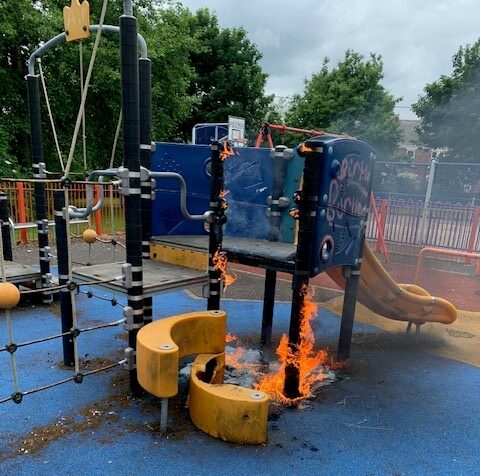Firefighters are calling for support from the public after responding to more than 2,000 deliberate fires in six months.
Tyne and Wear Fire and Rescue Service (TWFRS) have revealed, since the beginning of 2023, they have responded to incidents of grassland, wheelie bins, and even play parks being targeted by fire setters.
Their figures show there have been a shockingly high 2,055 deliberate fires set across the region since the start of the year.
Ryton Willows, a nature reserve in Gateshead, was an area that was seriously damaged by a wildfire last August, the cause of which is still unknown.
The fire saw six appliances, the fireboat and 28 firefighters battle the blaze for over 20 hours with three-and-a-half kilometres of woodland sadly destroyed.
But now TWFRS have revealed that, and since the start of June, firefighters have been called to 11 deliberate fires in the reserve – sparking concerns a wildfire could reignite there.
The ground has not fully recovered from the fire last summer, and the actions of a small few may permanently damage the reserve.
Group Manager Paul Thompson, Head of Service Delivery West for TWFRS, is responsible for the Gateshead area.
He says there have been 367 fires since the beginning of the year, an average of almost two a day, causing concerns about the safety of residents.
He has now encouraged parents, carers and members of the public to speak to the young people in particular about the dangers of this reckless behaviour.
Group Manager Thompson said: “Antisocial behaviour can have such detrimental effects on a community causing issues for so many people across the region.
“We’ve been working closely with Gateshead Council and Northumbria Police to see what provisions are in place to get our young people using their time more wisely rather than causing problems for our communities across the borough.
“As we get closer to the summer holidays, we often see spikes in antisocial behaviour across the region, so I really want to reach out to parents and carers and get them to speak to their children.
“We know that it’s only a small number of young people who engage in this type of behaviour, but if you have information that could help us to stop this we need to know.
“Firestoppers is a great service that we’ve worked alongside for many years, they offer free anonymous reporting on deliberate fire setting in your area, and I would ask that people use them to get this issue under control.”
Inspector Kevin Ashurst, of Northumbria Police, said: “Anti-social behaviour is never acceptable and that is why we continue to work with our partners and the local community to address any issues relating to it.
“Typically, in summer we see more people out and about which often coincides with us receiving more reports of this type of behaviour.
“As always, we’d ask the public to work with us by reporting any information about suspected incidents so that we can respond accordingly.
“Together, we can ensure our communities carry on being such welcoming places to live, work and visit.”
Councillor Angela Douglas, Chair of the Gateshead Community Safety Board, said: “It’s extremely disappointing that a small minority of people continue to behave in a way that’s so damaging to our green spaces and communities.
“Deliberate fires, even small ones, have serious consequences that young people may not fully understand.
“Please help us to tackle the issue and keep Gateshead safe and enjoyable for everyone by reporting deliberate fire setting.”
TWFRS are committed to working with partners from all over the region to combat antisocial behaviour.
This week is national ASB Awareness Week and regional agencies are encouraging anyone involved in disorder to take part in one of the many diversionary programmes on offer.
If you want to report information about deliberate fire setting in your community then you can report it anonymously to the fire service.
Contact independent charity FireStoppers on 0800 169 5558 and help make your area a safer place to live.
You can also contact Northumbria Police online at their website or by calling 101. In an emergency, where person or property is at risk, always dial 999.



